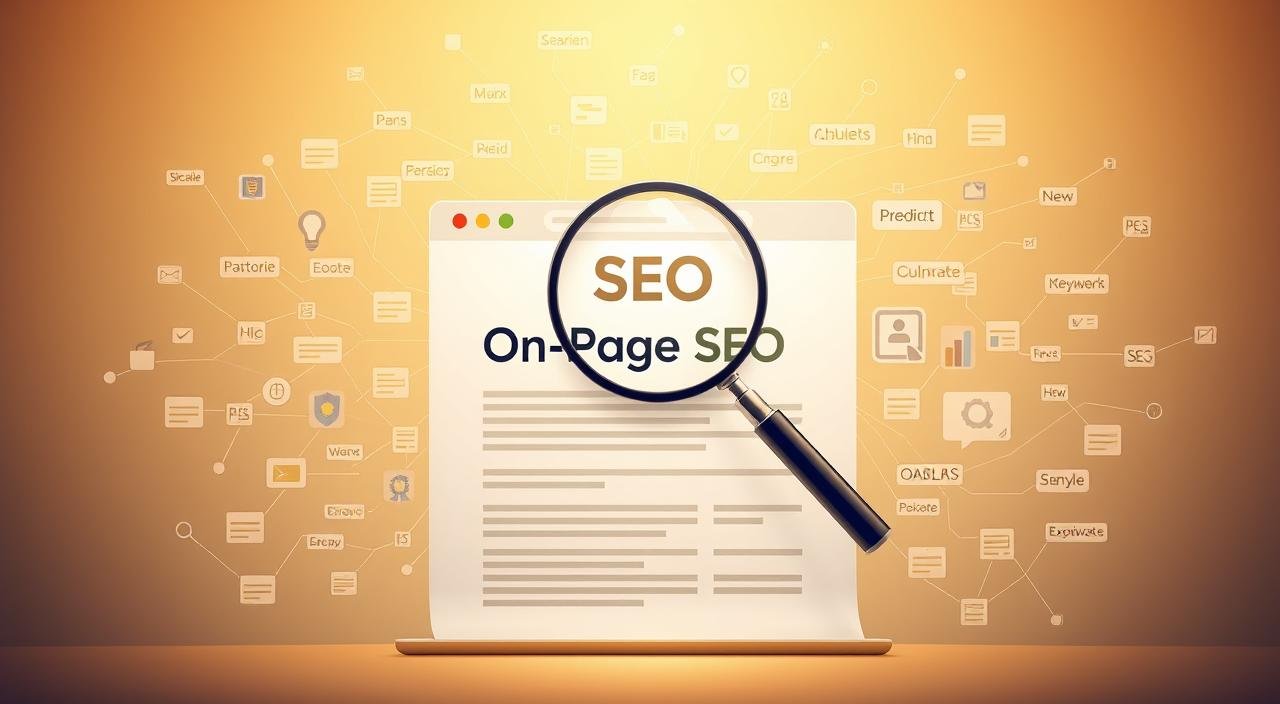About 70% of marketers find SEO better than PPC for making sales. This shows how key on-page SEO is for getting more website visitors and sales. It involves making title tags, content, internal links, URLs, and other factors better. These steps help your site show up more in search results.
By doing keyword research, using meta tags, and creating top-notch content, you can get more people to visit your site.

On-page SEO is vital for making your site more visible and ranking higher in search engines. It helps search engines know what your site is about and if it’s relevant. Making your site better for users, like reducing bounce rates and increasing time spent on your site, can also boost sales. So, on-page SEO is a must for any online marketing plan.
The Importance of Keyword Research
Key Takeaways
- On-page SEO is essential for website visibility and search engine rankings
- Keyword research is a critical component of on-page SEO
- Meta tags, including title tags and meta descriptions, play a significant role in on-page SEO
- High-quality content is essential for driving website traffic and conversions
- Optimizing for user experience factors can lead to higher conversions
- On-page SEO is more effective than PPC for generating sales, with approximately 70% of marketers preferring SEO
The Importance of Keyword Research
Keyword research is key in SEO. It helps find the best and most searched keywords for a website. This makes a site more visible and ranked higher on search engines. For 70% of marketers, keyword research is vital for SEO success.
To do good keyword research, use tools like Google Keyword Planner, Ahrefs, and SEMrush. These tools help understand keyword trends, competition, and how often people search for them. Long-tail keywords, being more specific, draw in targeted traffic and are easier to rank for. They make up 70% of all searches, showing their power in attracting the right visitors.
Some main benefits of keyword research are:
- It boosts website visibility and ranking on search engines
- It brings in more targeted traffic and boosts conversion rates
- It helps understand what users are searching for
https://www.youtube.com/watch?v=OMJQPqG2Uas
By adding keyword research to their SEO plan, site owners can make their content better for target keywords. This improves their online presence. Keeping keyword strategies up-to-date is crucial to keep up with search trends and user behavior. With the right keywords, site owners can increase conversions and better their SEO outcomes.
On-Page Optimization Techniques
Improving website visibility is key, and on-page optimization plays a big role. It involves tweaking elements like title tags, meta descriptions, and header tags. This makes content better and easier to read. shows how changing one word in a title can boost a blog post’s ranking by 7 places.
Title tags should be under 70 characters to avoid being cut off. Meta descriptions, which summarize the page, should be 155 characters or less. It’s also important to optimize header tags and content. This helps search engines understand the page’s topic and enhances user experience. Including target keywords in headings (H1, H2, H3) helps Google grasp the page’s topic.
Here are some tips for optimizing title tags, meta descriptions, and header tags:
- Use descriptive and keyword-rich title tags and meta descriptions
- Optimize header tags to improve content structure and readability
- Use image compression tools to reduce file sizes and improve site load times
- Internal links help search engines discover new pages and keep users on the site longer

By following these tips, website owners can boost their on-page optimization. This increases their chances of ranking higher in search engine results. points out that page speed is a Google ranking factor. It’s assessed through Core Web Vitals, including Largest Contentful Paint (LCP), First Input Delay (FID), and Cumulative Layout Shift (CLS).
The Importance of Internal Linking
This article’s final section talks about why internal linking is key for SEO and website authority. It’s a vital part of on-page SEO that can greatly affect your site’s rankings and visibility.
Internal linking is a key part of on-page SEO that can greatly affect your site’s rankings and authority. Googlebot uses links to find and rank content on websites. Pages with many internal links are seen as more important by Google. By improving your internal linking, you help search engines understand your website’s structure better. This leads to better indexing and higher visibility in search results.
A good internal linking plan can also spread the value of high-quality backlinks across your site, boosting your overall authority. Plus, internal links can lower bounce rates and increase dwell time. This tells Google your content is engaging and relevant to users. To get the most from internal linking, use descriptive anchor text, place links wisely, and check your linking structure often.
FAQ
What is on-page SEO?
Why is keyword research important for on-page SEO?
How can I optimize my website’s title tags and meta descriptions?
What is the importance of internal linking for on-page SEO?
Source Links
- On-Page SEO: The Definitive Guide + FREE Template (2025) – https://backlinko.com/on-page-seo
- SEO keyword research: What it is and why it’s important for SEO | Clearscope – https://www.clearscope.io/blog/what-is-keyword-research-in-SEO
- 5 Key Reasons Why Keyword Research is Important for SEO – https://www.seoptimer.com/blog/why-is-keyword-research-important/
- On-Page SEO: How to Optimize for Robots and Readers – https://ahrefs.com/blog/on-page-seo/
- On-Page SEO Activities: 8 On-Page SEO Techniques to Use – https://www.webfx.com/blog/marketing/on-page-seo-activities/
- On-Page SEO: What It Is and How to Do It – https://www.semrush.com/blog/on-page-seo/
- Internal linking for SEO: Why and how? – https://yoast.com/internal-linking-for-seo-why-and-how/
- Internal Linking for SEO: The Complete Guide – https://backlinko.com/hub/seo/internal-links

